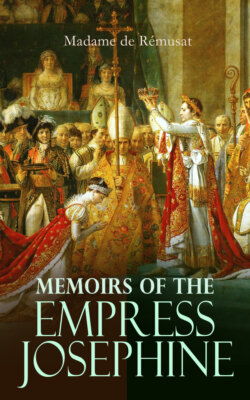Читать книгу Memoirs of the Empress Josephine - Madame de Rémusat - Страница 13
На сайте Литреса книга снята с продажи.
Bonaparte’s Mother
ОглавлениеTable of Contents
Mme. Bonaparte (née Ramolini) was married in 1767 to Charles Bonaparte, who belonged to one of the noble families of Corsica. It is said that there had been a liaison between her and M. de Marbeuf, governor of the island; and some went so far as to allege that Napoleon was the son of M. de Marbeuf. It is certain that he always showed kindness to the family of Marbeuf. However that may have been, the governor had Napoleon Bonaparte included among the number of noble children who were to be sent from Corsica to France, to be educated at a military school. He was placed at that of Brienne.
The English having become masters of Corsica in 1790, Mme. Bonaparte, a rich widow, retired to Marseilles with her other children. Their education had been much neglected, and, if we are to accept the recollections of the Marseillais as evidence, her daughters had not been brought up under the strict rule of a scrupulous morality. The Emperor, indeed, never pardoned the town of Marseilles for having been aware of the position his family occupied at that period, and the disparaging anecdotes of them imprudently repeated by certain Provençals seriously militated against the interests of the whole of Provence.
The widowed Mme. Bonaparte established herself at Paris on her son’s attainment of power. She lived a retired life, amassing as much money as possible; she meddled in no public matters, and neither had nor wished to have any influence. Her son overawed her, as he did all the rest of the world. She was a woman of very ordinary intelligence, who, notwithstanding the rank in which events placed her, never did anything worthy of praise. After the fall of the Empire she retired to Rome, where she lived with her brother, Cardinal Fesch. It is said that he, in the first Italian campaign, showed himself eager to profit by the opportunity of founding his fortune which then presented itself. He acquired, received, or even took, it is said, a considerable quantity of pictures, statues, and valuable articles, which have since served to decorate his various residences. When he afterward became a Cardinal and Archbishop of Lyons, he devoted himself wholly to the duties of his two great offices, and in the end he acquired a most honorable reputation among the clergy. He often opposed the Emperor while his disputes with the Pope were pending, and was not one of the least obstacles to the execution of Bonaparte’s wishes on the occasion of the futile attempt to hold a council at Paris. Either for political reasons or from religious motives, he made some opposition to the divorce; at least, the Empress Josephine believed him to have done so. I shall go more into details on this subject hereafter. The Cardinal has, since his retirement to Rome, preserved the unvarying favor of the Sovereign Pontiff.
